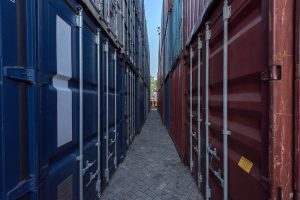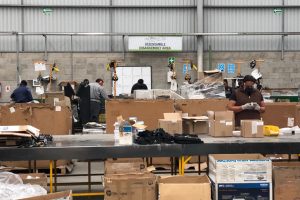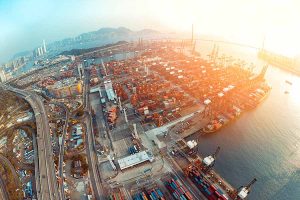 China has ratcheted up inspection requirements for recyclables imported from the U.S., requiring every load to be opened for inspection and temporarily shutting down the only organization providing pre-shipment approval in the U.S.
China has ratcheted up inspection requirements for recyclables imported from the U.S., requiring every load to be opened for inspection and temporarily shutting down the only organization providing pre-shipment approval in the U.S.

 China has ratcheted up inspection requirements for recyclables imported from the U.S., requiring every load to be opened for inspection and temporarily shutting down the only organization providing pre-shipment approval in the U.S.
China has ratcheted up inspection requirements for recyclables imported from the U.S., requiring every load to be opened for inspection and temporarily shutting down the only organization providing pre-shipment approval in the U.S.
 The owner of a closed CRT glass processing company has pleaded guilty to federal conspiracy and hazardous waste charges.
The owner of a closed CRT glass processing company has pleaded guilty to federal conspiracy and hazardous waste charges.
 Households may like the convenience of leaving used electronics at the curb for collection, but doing so can give scavengers the opportunity to grab devices and any sensitive data they may hold. A new company is trying to solve those problems in areas around Philadelphia.
Households may like the convenience of leaving used electronics at the curb for collection, but doing so can give scavengers the opportunity to grab devices and any sensitive data they may hold. A new company is trying to solve those problems in areas around Philadelphia.
DeVries Information Management of Spokane, Wash.; Gilmore Services of Pensacola, Fla.; Heart of Texas (HOT Shred) of Elm Mott, Texas; MARCO of St. Cloud, Minn.; Maxxim of Rush City, Minn.; MinnKota Secured Document Destruction of Fargo, N.D.; Shred-IT USA of Airway Heights, Wash.; and Shred-IT USA of Pensacola, Fla. and have either achieved or renewed their NAID certifications for physical destruction of hard drives.
Visit our archive to view previous editions of the scorecard.

The processing line at Proambi’s facility in Mexico, photo courtesy of Salvador Río
Mexico may be America’s neighbor to the south, but in some ways, the e-scrap ecosystems in the two nations are worlds apart. And perhaps the biggest difference is the fact that in Mexico, an informal system of electronics collection and processing is well-established.
 Electronics repair advocates are speaking in defense of a refurb executive sentenced to prison for illegally copying Microsoft software.
Electronics repair advocates are speaking in defense of a refurb executive sentenced to prison for illegally copying Microsoft software.

Readers flocked to a story about a major processor’s bankruptcy filing, but they also clicked on stories about metals recovery research, CRT management challenges and certification changes.
The U.S. EPA solid waste chief during the Obama Administration is now helping to push forward circular economy principles, and some of his work could help reshape electronics recovery in developing areas of the world.
 The administrator of the R2 recycling standard has detailed what is and isn’t legal when shipping used electronics and e-scrap to Hong Kong.
The administrator of the R2 recycling standard has detailed what is and isn’t legal when shipping used electronics and e-scrap to Hong Kong.
Continue Reading
 An online marketplace for refurbished devices has expanded into the U.S., and company leaders are looking for refurbishers to join the platform.
An online marketplace for refurbished devices has expanded into the U.S., and company leaders are looking for refurbishers to join the platform.
